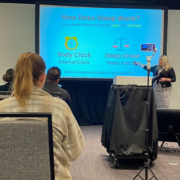They say good employees are hard to come by. However, when treated well, properly trained and supported, everyone becomes a good employee.
Whether it’s RSAs who are on the front lines every day, or everyone behind the scenes keeping the machine running, as a manager, showing them that you value them is crucial to their mindset at work. But how that is done is something business leaders can have trouble with.
When asking the industry about this question, we found retailers are extremely passionate about how well they treat their employees. It all comes down to person-to-person relationships.
But before even getting into how to treat employees, Michael Wipfler, director of sales for Mueller Furniture in Illinois and Missouri, says one of the most impactful ways to show genuine appreciation for your team is through the practice of self-care.
“This might sound counterintuitive at first, but the reality is, if you don’t take care of yourself, you can’t effectively lead or inspire others,” he says. “Self-care is not a luxury; it’s a necessity. If we neglect our health, fitness, relationships, spirituality and finances, we become stressed, tired, distracted and ultimately ineffective. Employees are keen observers — they notice when their leaders are overwhelmed or disengaged. Conversely, they are inspired and motivated by leaders who are energized, positive and equipped with the knowledge and tools to succeed.
“When leaders prioritize self-care, they set a powerful example for their teams.”
He explains that by creating this type of environment, employees feel valued not just through words but through the lived example of a balanced and fulfilled leader.
“Ultimately, employees want to work for and with someone who is grateful and energetic,” he adds. “They are more likely to take your advice and follow your lead if they see that you embody the principles you advocate. By investing in self-care, you’re not only enhancing your own life but also creating a ripple effect that benefits your entire team. In valuing yourself, you inherently value your employees, setting the stage for a healthier, happier and more productive workplace.
Getting creative and personal
Chuck Spivey, owner of Affordable Mattress, says that being unpersonable as a leader — especially when the employees see the volume they do — can hurt the relationship. Instead, understand their wants and needs.
“Give them a bonus paycheck, and be easy and simple when they need time off,” he says. “Don’t make taking time for their family needs difficult. Treat them as you want to be treated.”
A few ideas straight from Jeff Giagnocavo at Gardner’s Mattress & More in Lancaster, Pennsylvania:
- $100 +/- birthday gift.
- We split up a whole beef cow in the summer; closers eat steak.
- Christmas bonus.
- Surprise lunches.
- Consistent schedule.
- Don’t bother them when they are off.
Ryan Bailey, buyer and visual merchandiser for Mattress World Northwest in Oregon, adds that every employee will value different things, and understanding what motivates different personalities is one thing.
“Treat them with respect, be honest, be direct, don’t talk to them in circles and be available to them,” he says. “Be open to input and allow them to give feedback. We have our core values; Empowering employees to live their best lives possible would be one of the core values, so we are constantly making decisions with the betterment of the employee in mind.”
However, it also helps to know what not to do, and Andrew Anderson, a sales representative at The Sleep Shoppe Newbury Park in California, has a few pointers.
First, be inclusive when providing food for the whole team. Ask them if they have any special needs or allergies and be sure to accommodate them.
And it doesn’t have to be as extensive — it can be a paid day off or sick time honored without hassle. Something as simple as acknowledgment also goes a long way.
“I know stores are fighting for survival and we all want more money that we may not get — but simple words like ‘good job’ go a long way,” Andersons says. “Invest in your employees, don’t favor some over others and remember that learning is a constant process even for those who have been with your company for years.”





